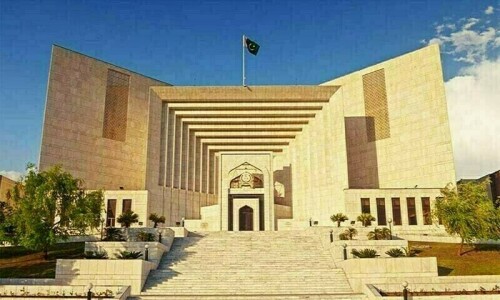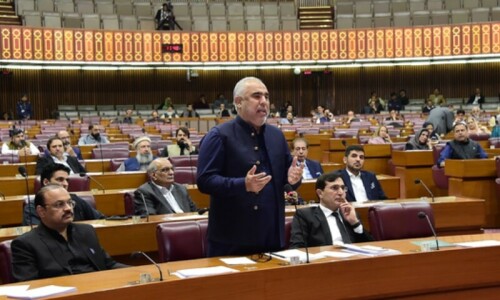
Aur Faraz chahyein kitni muhabbatein tujhe
Ma’on ne terey naam per bachon ka naam rakh dia
[What more love do you need Faraz?
Mothers have named their children after you]
When I give lectures to my students, I usually sit on the table with my legs dangling below. I was sitting in the same position that day, looking at my bunch of media studies students.
We were supposed to discuss the topic ‘journalism in evolving societies’, but they were in no mood to do so. We reluctantly began discussing the various meanings of an evolving society anyway. Suddenly, a student asked me if I believed in love.
Unsure of what made him ask the question, I countered his query with mine. “What does that have to do with ‘evolving societies’?”
Should poetry be contextualised?
“Without love no society can evolve, ma’am,” was his response.
Although what he said wasn’t incorrect, I knew the discussion was headed in the wrong direction. And before I knew, the 22 students, who looked rather worn-out earlier, were suddenly filled with inexplicable energy. The unregulated discussion veered towards love poetry. Interestingly, more than half of them adored poet extraordinaire Ahmad Faraz.
In a world where Urdu poetry does not have a vast audience, this unusual passion pleasantly surprised me. The rest of the class was spent talking about Faraz. I did not mind, especially because January 2017 marked his 86th birth anniversary — he was born on January 12, 1931. A good time to remember the man and his incredible thoughts!
For most young people in India who are familiar with Urdu poetry, Faraz is known only for his love poems. “Have you heard the ghazal Ranjish hi sahi?” they eagerly asked. Of course, I had. And then I drew a blank when I tried to find out whether they were familiar with his iconic and intrepid poem Muhasra. I found that strange.
Faraz was a poet who believed in egalitarianism and fearlessly wrote against capitalism. Not just that, he was one of the handful of writers and poets who resisted military dictators in Pakistan. I asked my students if they knew that Faraz went to Europe in an act of a self-imposed exile during Ziaul Haq’s rule in the 1980s. They didn’t.
Well, he was brave enough to condemn the political situation of the country in a mushaira before he moved out, I told them. Clearly, some of them had begun to see the man differently now.
The problem in the subcontinent is that, unlike in the West, very few poets are studied the way their works merit. I am not advocating a ruthless analysis of poetry, ripped apart by dry academic theories. However, we are required to study our poets closely to understand the contexts in which they write.
How many generations of students have studied the English poets Chaucer, Keats and Donne? And has that knowledge not enhanced our understanding of the times these poets lived in? Poetry transcends geographic and temporal boundaries. What a poet said about Victorian England could very well ring true for a post-colonial South Asian society.
I am sure someone sitting in Lahore University or Aligarh Muslim University is studying these poets. But such knowledge shouldn’t be limited to tiny Urdu academic circles. Most of our great poets end up being limited to WhatsApp forwards and mobile phone text-messaging (by the way, a majority of the verses forwarded have no regard, whatsoever, for prosody and in the case of Faraz, most are made up as well). That is where we enjoy them. And that is where we forget about them.
Gham-i-duniyaa bhi gham-i-yaar mein shaamil kar lo Nasha barrhta hai sharabein jo sharaabon mein milein [Add worldly woes to the grief caused by the beloved Mixing spirits increases the intoxication]
For instance, a quick internet search doesn’t tell us when Ranjish hi sahi was penned and in what context. Therefore, it becomes a defeated lover’s plea to his rather callous beloved. While the ghazal is meant to be a steadfast companion to pining lovers on lonely nights, perhaps a scholar would have gone beyond that to elicit different meanings out of such a profound piece of poetic expression.
One of my students said, “But we will remember the poets throughout our lives because they have touched a special part of our hearts.” He took a pause and continued, “Do we necessarily have to overanalyse them?”
He was right. There was no need to overanalyse poetry or the poets we hold in high esteem. “What is wrong with studying them?” I asked. You always have the option of reading their poetry and not bothering yourself with its criticisms or analyses. But, if there are no credible academic studies at all, then you don’t have that choice.
Can we, for instance, talk about Faraz’s concept of a revolution with any conviction? Do we know, in detail, the kind of society he envisioned for his people? Or was he consistent about his idea of romantic love? An Urdu newspaper once quoted him opposing the institution of marriage. Isn’t there a couplet that puts this into focus?
As much as he loathed Zia’s rule, he had admitted that the dictatorial regime proved highly inspiring for his work. Take, for example, the following verse:
Gham-i-duniyaa bhi gham-i-yaar mein shaamil kar lo
Nasha barrhta hai sharabein jo sharaabon mein milein
[Add worldly woes to the grief caused by the beloved/Mixing spirits increases the intoxication]
Is it possible that he was talking specifically about Zia’s regime and the depressing times that came along with it for Pakistani intellectuals and artists?
It is no secret that Faraz returned one of Pakistan’s prestigious civilian awards, Hilal-i-Imtiaz, as a symbol of protest against Pervez Musharraf’s government. “It was the worst phase for our country’s writers,” he told the New York Times in 2006. “Yet it also provided ample food for thought to poets and made protest poetry so popular in Pakistan.”
My student had hit the nail on its head right at the start. Societies cannot evolve without love. And our love for poetry can be a means to try and understand the process of this evolution — personal, societal and political.
The writer is an independent multimedia journalist on human rights in India. She tweets @raksha_kumar
Published in Dawn, Sunday Magazine, February 5th, 2017















































